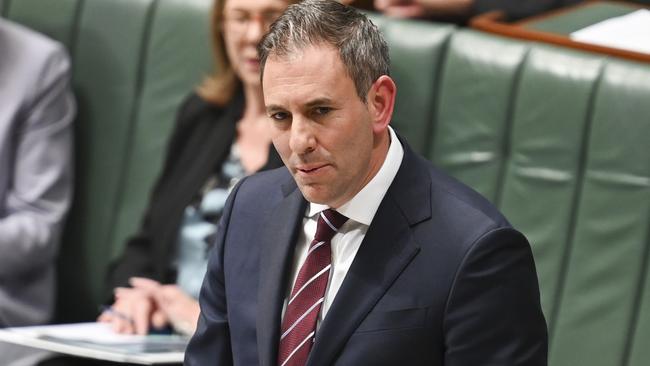
Wednesday’s inflation numbers have shot Jim Chalmers’ budget strategy to tame inflation out of the sky.
Labor’s economic credibility, and its claim to be giving a voice to middle Australia’s concerns have rarely been so divorced from reality.
As Prime Minister, Albanese is now a leader detached from the primary mission, as Labor’s political priorities align more radically with the political class and become adrift from the mainstream.
His authority as Prime Minister has been brutally undermined this week on three fronts. All of which have vaporised the endowment Peter Dutton may have afforded the government, if that is an accepted political reality, over nuclear power.
The PM’s refusal to enforce a century-old rule in the Labor Party on caucus solidarity over Muslim Labor senator Fatima Payman’s predictable decision to cross the floor over the Palestinian question has set a new precedent for disunity.
Is Jewish Labor MP Josh Burns now free to back Coalition motions in support of Israel, if he sought the courage to do so?
The image of division within the Labor ranks has inevitably resurfaced. And as Paul Keating was fond of saying, albeit from the Matthew the Disciple’s Biblical reference, a house divided is one that cannot stand.
The second is the spectacle of Julian Assange’s release from prison. Labor’s embrace of this rogue’s new-found Liberty and Albanese’s proclamation of a personal involvement in his release would be understandable if popping champagne corks in Marrickville is what it seeks.
Both issues diverted the government from the central political issue. But in a dose of reality, Albanese was abruptly interrupted from its indulgence, when the government was indeed forced to return to the issue that it needed to be most focused on.
In hindsight, it is easy to see why the PM would have preferred to be exulting in issues irrelevant to everyone else.
The real issue is one he doesn’t really want to discuss.
Chalmers has run out of sandpaper on the spinning of inflation. The only group within the community to have a grasp on what the rise in inflation means in a tangible sense is the community itself.
Albanese’s claim, made in a speech on Wednesday and presumably drafted before the official figures were released, was that Labor had brought inflation down since being elected.
On an annualised basis, anyone knows this is at least a contested claim to make, at worst it assured.
In the year to March 2022, underlying inflation was 3.8 per cent, with a headline running at a rate of 5.1 per cent.
Little has changed since then.
Monthly inflation excluding volatile agents in the past 12 months is 4.1 per cent. There is not a lot of difference between what they have delivered and what they promised to deliver.
The prospect of a further rate rise is now more likely. But what is certain is that the current high-rate environment is likely to stay high for a lot longer.
The Treasurer now owns these numbers, and Albanese will own the consequences.
The political and economic significance of this should be obvious, notwithstanding the Coalition’s failure to realise this yet with its inability this week to prosecute a credible counter-attack.
What all this means politically, is questionable,
It certainly complicates Labor’s early election strategy, should it have one, considering the prospect of going early to pre-empt a Christmas recession must be now weighed against the increased likelihood of a pre-Christmas rate hike.
Chalmers and Albanese’s discussions will now likely be confined to choosing their preferred poison.




Anthony Albanese’s week has gone from bad to worse. And there are few signs that it will get better from here.